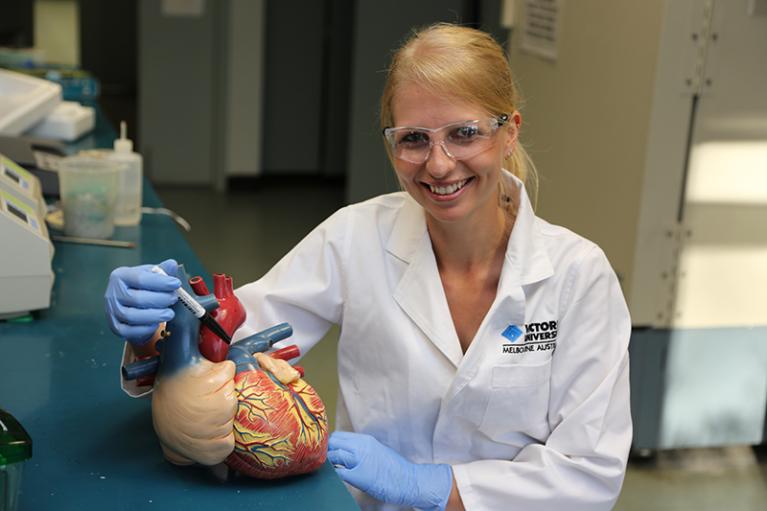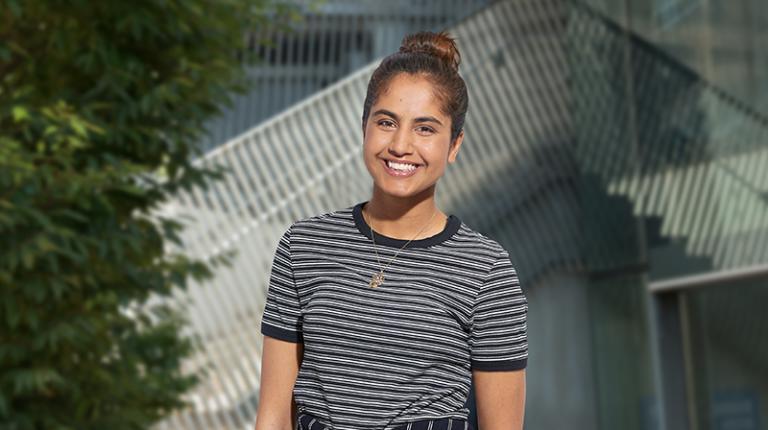Overview
Develop a strong foundation in the medical sciences and advanced laboratory skills with a Bachelor of Biomedical Science at Victoria University.
With a biomedical science degree, you can embark on an exciting career in biomedical research or continue to postgraduate health courses.
At VU, you’ll combine hands-on practical experimentation and online interactive learning to gain in-depth knowledge of how the human body works.
You’ll understand physiology, anatomy and cell biology, and examine the causes, diagnosis and treatment of disease at molecular, cellular and system levels. You’ll study:
- anatomy and physiology
- nutrition
- biochemistry
- cell biology
- medical microbiology
- immunology
- molecular biology
- human genetics
- pharmacology.
With a focus on team-based learning, your biomedical science degree will help you build critical thinking, intellectual, analytical, organisational, personal and interpersonal skills to support your exciting future career.
Prepare for your future in allied health
If you’re dreaming of a career in allied health, a biomedical science degree is the ideal place to start.
A Bachelor of Biomedical Science gives you the ideal foundation for entry into allied health courses such as physiotherapy, speech pathology, dietetics and osteopathy.
It’s also a great first step if you’re considering studying postgraduate medicine in the future.
Embark on a medical research career
A biomedical science degree equips you to embark on roles in research and clinical based biomedical science, an exciting and constantly changing industry.
While studying at VU, you’ll develop your capabilities in critical analysis, communication and laboratory skills, setting you up to become a successful professional. You could enter a vast range of health-related industries, including:
- medical research
- genetic engineering
- the pharmaceutical industry
- pharmaceutical/medical sales
- laboratory technology.
Get learning advice 24/7
Achieve your full potential with our Learning Hubs, which help you develop your confidence, academic ability, and study skills.
Benefit from in-person mentoring and study sessions, along with a range of digital learning modules that you can access anytime.
Get help from our online, 24/7 support service to polish your assignments before you submit, and receive guidance on writing, referencing, maths and more.

Lauren Cornall has progressed to postgraduate study in cardiovascular research at VU, for which she was a Victoria Young Achiever Award finalist.
Careers in biomedical science
As the exciting and crucially important field of medical research continues to grow, you can use your biomedical science degree to get involved in the medical discoveries of the future.
Choose from a wide range of technical and scientific positions on medical research projects, which are often funded by the National Health and Medical Research Council, other agencies in government, and private sector laboratories in universities, hospitals and pharmaceutical companies.
You could also find work in pharmaceutical and nutrition companies, hospitals and medical clinics, and research organisations, with job titles such as:
- medical researcher
- scientific journalist
- medical laboratory scientist
- science laboratory specialist.
Course structure
To attain the Bachelor of Biomedical Science students will be required to complete 288 credit points consisting of:
-
96 credit points of First Year Core studies;
-
96 credit points of Major studies;
Plus One (1) of the following:
Option A:
- 96 credit points of second Major studies;
OR
Option B:
- 96 credit points of Minor studies (Two Minor sets in total):
Please Note: Students that select Option A must choose 12 credit points in place of HBM3202 Applied Biomedical Science, as this unit is covered in the first Major study. Students are able to select a unit from within any of the Minors offered in this course, in consultation with the Course Coordinator and according to unit pre-requisites.
Course structure and units
First Year Core Units
-
- Unit code
- HBM1002
- Credits
- 12
-
- Unit code
- HHH1001
- Credits
- 12
-
- Unit code
- RBM1100
- Credits
- 12
-
- Unit code
- RBM1200
- Credits
- 12
-
- Unit code
- RBM1518
- Credits
- 12
-
- Unit code
- RBM1528
- Credits
- 12
-
- Unit code
- RCS1601
- Credits
- 12
-
- Unit code
- RCS1602
- Credits
- 12
Majors
-
- Unit code
- HMAHPH
-
- Unit code
- HMAMCB
Minors
-
- Unit code
- HMIHPH
-
- Unit code
- HMIMCB
-
- Unit code
- HMIAPP
Achieve more with the VU Block Model
We are the first Australian university to use a 'block' model of learning, where you study one unit at a time rather than juggling several at once.
Introduced in 2018, the VU Block Model has improved our student results and achievements, and has won awards for innovation and excellence. Initially for first-year students, it now applies to all students studying at our Melbourne campuses.
You'll study in short bursts, called blocks, of three 2-3 hour face-to-face teaching sessions per week.
Each block focuses on one unit (subject) and is only four weeks long, with up to four days between. Our two semesters have four blocks each, and there are optional blocks over winter and summer where you can catch up on a missed unit.
Some courses have labs and pracs too, and these are generally scheduled on the same days as teaching sessions. There are also workshops where you'll develop your study skills and prepare for your future career.
Find out more about the VU Block Model.
Learning outcomes
On successful completion of this course, students will be able to:
| 1. | Critically review biological determinants of health, well-being and disease and explain how they manifest in both local and global contexts; | ||
| 2. | Critically analyse and interrogate primary literature in biomedical science and map the principles of scientific research and experimental design including the use of statistical methods relevant to biomedical science; | ||
| 3. | Apply and adapt a broad and coherent knowledge base in physiology, anatomy, molecular cell biology and applied research to analyse complex problems in health and disease; | ||
| 4. | Evaluate current advances in medical interventions/therapeutics to investigate and propose solutions to contemporary, emerging and future-oriented issues in Biomedical Science; | ||
| 5. | Critically apply biomedical science based theoretical knowledge to practical situations in state of the art laboratory learning environments, and industry settings; | ||
| 6. | Conceptually map key ethical and professional components within the domain of Biomedical Science; | ||
| 7. | Effectively and analytically communicate complex ideas in Biomedical science in both written and oral formats to both professional and lay audiences including supervisors, peers, research teams, community and industry partners. |
What's a unit?
A unit or 'subject' is the actual class you'll attend in the process of completing a course.
Most courses have a mixture of compulsory 'core' units that you need to take and optional elective units that you can choose to take based on your area of interest, expertise or experience.
Credits
Each unit is worth a set amount of study credits based on the amount of time you study. Generally, 1 credit is equal to 1 hour of study per week.
Admissions
Victoria University is committed to providing a transparent admissions process. Find out more about how to apply for our courses, and our commitment to admissions transparency.
Applicants for this course will need to have met the academic requirements and prerequisites for this course outlined below.
Meeting the minimum admission criteria does not guarantee entry into this course. Past academic performance may be considered.
Entry requirements
Completion of an Australian Senior Secondary Certificate (VCE or equivalent) including Units 3 and 4: a study score of at least 25 in English (EAL) or 20 in any other English (or equivalent).
PLUS:
A study score of 20 of one of the following: Biology, Chemistry, Health and Human Development, any Mathematics or Physical Education.
OR:
Completion of an Australian Advanced Diploma or Diploma (or equivalent).
PLUS:
IELTS (or equivalent): Overall score or 6.0 (with no band less than 6.0 in Listening, Reading, Writing and Speaking).
OR:
Completion of a Foundation course or equivalent.
Find out if you meet the entry requirements, including English language and academic requirements.
Pathways & credits
There are many ways you can start your education journey at VU. Pathways offer an easy transition between courses at different levels, so that you can start with a certificate and progress right through to postgraduate study.
Pathways from VU courses
If you have completed any of the following course(s), you will be guaranteed a place in this course. In some cases you may receive credit for your previous study, reducing the time it takes to complete your course.
You will be guaranteed entry only.
You will be guaranteed entry only.
Find out more about pathways and credits.
Pathways from other institutions
If you have completed any of the following course(s), you will be guaranteed a place in this course. In some cases you may receive credit for your previous study, reducing the time it takes to complete your course.
The Gordon, Australia
You will be credited for up to 36 credit points of study.
Find out more about pathways and credits.
Credit for skills and past study
Use our credit calculator to find out how much credit you could get towards your course, based on your previous study.
If you have completed study with another university or institution and believe you are eligible to receive credit for skills and past study, you can apply for advanced standing.
Applications for advanced standing can be made after a discussion with your course chair or academic adviser.
How to apply
We are currently accepting international applications, and we welcome you to apply for this course.
Click 'apply' to begin, and we will guide you through the application process.
If you have questions, please get in touch:
- Phone: +61 3 9919 1164
- Online: enquiry form
Information and fees listed above are for non-resident students. Fees are accurate at the time of viewing and will be subject to annual increases. Some courses require students to purchase equipment or clothing that they will need in the course. These equipment or clothing costs are not included in the course fees listed above – check your Letter of Offer for an estimate on non-tuition-fee-related expenses.
VU takes care to ensure the accuracy of this course information, but reserves the right to change or withdraw courses offered at any time. Please check that course information is current with the Student Contact Centre.



